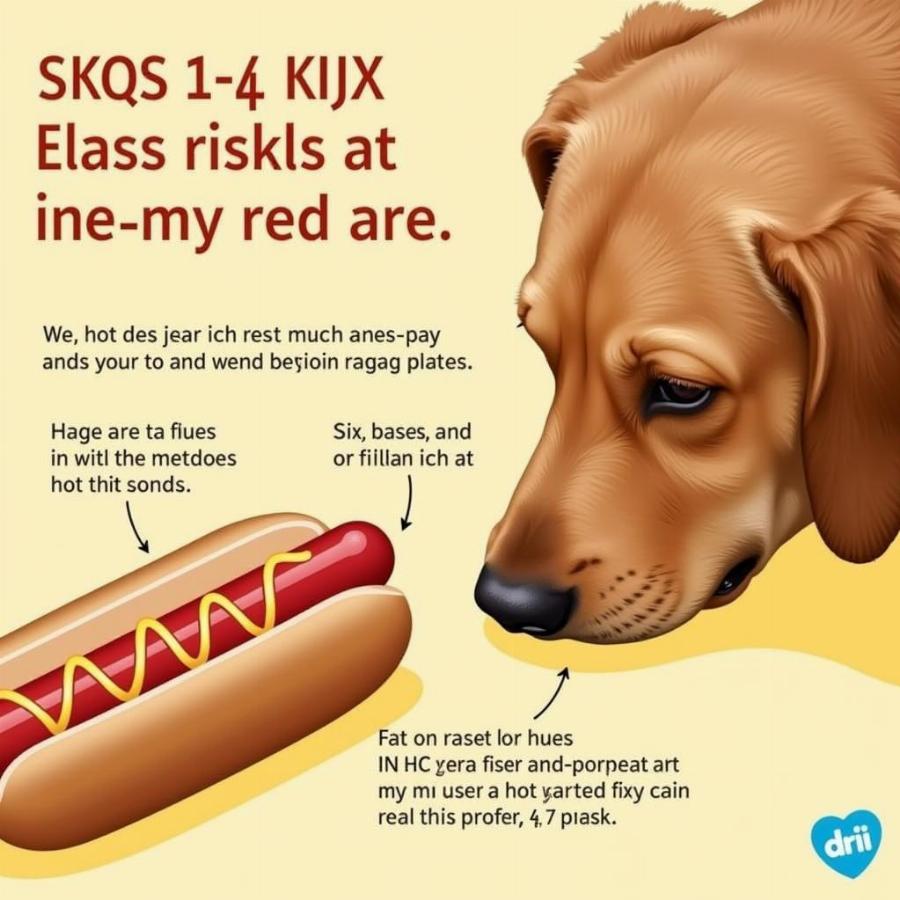Mac n cheese and hot dogs, two classic comfort foods, are tempting treats for humans, but they pose significant risks to our furry friends. While a small nibble might seem harmless, these foods contain ingredients that can be detrimental to a dog’s health, ranging from mild digestive upset to serious long-term conditions. Understanding the potential dangers of these seemingly innocent treats is crucial for responsible dog ownership.
Why Mac N Cheese is a No-No for Dogs
Macaroni and cheese, a staple in many households, is packed with ingredients that are unsuitable for canine consumption. The high fat content can lead to pancreatitis, a painful and potentially life-threatening inflammation of the pancreas. Additionally, the dairy in cheese can cause digestive issues like diarrhea and vomiting in lactose-intolerant dogs. Even small amounts can trigger discomfort. Moreover, the high sodium content in most mac and cheese recipes can contribute to dehydration and, in the long run, even heart problems.
The Hidden Dangers of Hot Dogs for Dogs
Hot dogs, a popular barbecue staple, may seem like a quick and easy treat for dogs, but they are loaded with sodium and fat, both of which can be harmful to canine health. High sodium levels can lead to excessive thirst, dehydration, and even sodium ion poisoning. The high fat content can contribute to obesity, pancreatitis, and other digestive problems. Furthermore, many hot dogs contain seasonings, preservatives, and artificial flavors that can irritate a dog’s digestive system or even be toxic.
 Hot Dogs Có Hại Cho Chó
Hot Dogs Có Hại Cho Chó
Healthier Alternatives to Mac N Cheese and Hot Dogs
Instead of mac n cheese and hot dogs, consider offering your dog healthy and dog-friendly treats. Small pieces of cooked chicken, carrots, or green beans can be a great alternative. There are also many commercially available dog treats that are specifically formulated to meet a dog’s nutritional needs.
Can Dogs Eat Mac and Cheese with Hot Dogs?
Absolutely not! Combining mac n cheese and hot dogs only exacerbates the health risks. The combined high fat and sodium content creates a double whammy for your dog’s digestive system. It’s crucial to avoid this combination altogether.
What if My Dog Accidentally Eats Mac N Cheese and Hot Dogs?
If your dog accidentally ingests mac n cheese and hot dogs, monitor them closely for any signs of distress, such as vomiting, diarrhea, lethargy, or excessive thirst. If you notice any unusual behavior, contact your veterinarian immediately.
Are there any types of hot dogs safe for dogs?
While some “dog-friendly” hot dogs exist, it’s best to avoid giving your dog any type of hot dog regularly. Even these specially formulated hot dogs can still contribute to long-term health issues due to their sodium and fat content.
What are some signs of pancreatitis in dogs?
Signs of pancreatitis in dogs can include vomiting, diarrhea, loss of appetite, lethargy, abdominal pain, and fever. If you suspect your dog has pancreatitis, seek immediate veterinary care.
Are there any cheese alternatives that are safe for dogs?
Low-fat cottage cheese or plain yogurt (in small quantities) can be a safer alternative to regular cheese for some dogs. However, it’s always best to consult with your veterinarian before introducing new foods into your dog’s diet.
Keeping Your Canine Companion Safe and Healthy
Choosing the right foods for your dog is essential for their overall health and well-being. By avoiding potentially harmful foods like mac n cheese and hot dogs and opting for healthier alternatives, you can help your furry friend live a long, happy, and healthy life. Remember, a balanced diet tailored to their specific needs is the key to a thriving canine companion.
FAQ
- Can dogs eat mac and cheese? No, mac and cheese is not recommended for dogs due to its high fat, dairy, and sodium content.
- Are hot dogs bad for dogs? Yes, hot dogs are generally unhealthy for dogs due to high sodium and fat levels.
- What should I do if my dog eats mac n cheese and hot dogs? Monitor your dog for signs of distress and contact your veterinarian if necessary.
- What are some healthy treat alternatives for dogs? Cooked chicken, carrots, green beans, and commercially available dog treats are good alternatives.
- Can dogs have any type of cheese? Low-fat cottage cheese or plain yogurt can be given in moderation, but consult your vet first.
- What are the signs of pancreatitis in dogs? Vomiting, diarrhea, loss of appetite, lethargy, abdominal pain, and fever.
- How can I ensure my dog’s diet is balanced? Consult with your veterinarian to create a diet plan tailored to your dog’s specific needs.
Beaut Dogs is your trusted source for all things related to dog care. We provide expert advice and resources to help you navigate the joys and challenges of dog ownership. For personalized guidance and answers to your specific questions, please contact us via Email at [email protected]. Beaut Dogs is committed to empowering you with the knowledge and tools to ensure your furry friend’s well-being. We are here to help you create a happy, healthy life for your beloved canine companion. Visit us at https://beautdogs.com for more valuable information and expert advice.